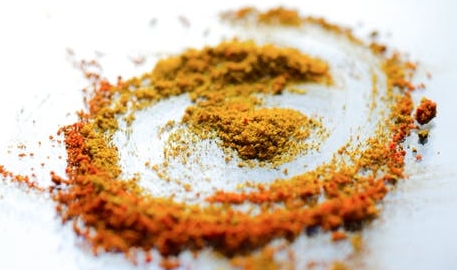Turmeric
Turmeric
Turmeric is the root (rhizome) of the herbaceous perennial plant of the ginger family. It is native to south East Asia and Indian countries and has been used to reduce many ailments in Chinese as well as Ayurvedic and Arabic medicines.
Turmeric active ingredient
The active ingredients in turmeric are called curcuminoids and the main ingredient is called curcumin which gives turmeric its bright orange/ yellow pigment (that stains, clothes, hands and bench tops) and also provides turmeric with its peppery taste.
Turmeric is wonderful in cooking for its vibrant colour and spicy taste but did you know Turmeric also has an array of medicinal properties?
Turmeric has medicinal properties
Research suggests turmeric has amazing health benefits for the brain and body. These include, anti-inflammatory properties, anti-oxidant properties, lowers the risk of heart disease, decreases the risk of colorectal cancers, increases Brain-Derived Neurotropic Factor (BDNF), aids in the prevention of Alzheimer’s disease, helps reduce symptoms of arthritis and is effective as an anti-depressant.
So let’s take a look!
Anti-Inflammatory: Curcumin acts as an anti-inflammatory by targeting multiple steps in the inflammatory pathway, thus blocking a molecule that travels to the nuclei of the cell that turns on the genes for inflammation.
Antioxidants: Curcumin can neutralise free radicals due to its chemical structure. This offers protection against lifestyle diseases and can stimulate the activity of the body’s own antioxidants enzymes by activating biochemical marker enzymes. In other words, recognizing, degrading, and removing damaged cells and stopping damaged cells from multiplying.
Heart disease: Studies have shown curcumin can lead to improvements in endothelial function, and as discussed above reduces inflammation and oxidation which are also important factors in heart disease.
Decreased risk of colorectal cancer: Research has shown the curcumin obstructs the formation of cancer cell growth by destroying damaged cells and pausing the multiplication of damaged cells within the colon.
Brain Derived Neurotropic Factor (BDNF): Curcumin increases brain levels of BDNF. This basically means it’s a growth hormone that stimulates and forms new connections (neurons) and pathways in the brain that multiply and increase in number.
Alzheimer’s disease: Curcumin is effective in pausing or even reversing age related diseases in the brain. It does this by crossing the blood brain barrier and can detangle the build-up of Amyloid plaques that have been shown to strongly contribute to the cause of Alzheimer's disease. .
Arthritis: Various studies have shown curcumin can be an effective anti-inflammatory drug in vitro and in animal studies against symptoms of arthritis, however further research is required on humans.
Anti-depressant: Curcumin has been researched in the treatment of depression. Curcumin leads to improvements similar to Prozac and has been evidenced as an effective anti-depressant. Depression is also connected to reduced levels of brain-derived neurotrophic factor and as mentioned above Curcumin can boost BNDF levels which potentially reverses some of these changes.
Curcumin is a non-toxic natural antioxidant that promises an array of medicinal properties. However, curcumin is poorly absorbed into the bloodstream and so needs to be consumed with black pepper. In addition, it is fat soluble so it will be beneficial taken with milk or a fatty meal.
If you want to experience the full effects of turmeric, then you may need to take an extract that contains significant amounts of curcumin like A Complete 3- Liquid extract from Three Springs Farm. You can find this product now in my shop.
I also love to cook with turmeric.
Here are some cooking tips to include turmeric in your diet from food.
You can include turmeric in stews, rice, soups, casseroles, pasta dishes like boscaiola, stir-fries, curries, in tea, smoothies, juices, and lately the new thing lattes.
Check out my " Feeling Good" smoothie that's sure to beat the winter blues and bring a bit of sunshine and happiness to your day made with Turmeric, mandarins and coconut.
References:
Australian healthy Food Guide. (n.d) Should you be eating more turmeric? Retrieved from http://www.healthyfoodguide.com.au/articles/2016/september/should-you-be-eating-more-turmeric
Gunnars, K. (2017). 10 Proven health benefits of turmeric and curcumin. Retrieved from
https://www.healthline.com/nutrition/top-10-evidence-based-health-benefits-of-turmeric#section1
Henrotin, Y., Priem, F., & Mobasheri, A. (2013). Curcumin: a new paradigm and therapeutic opportunity for the treatment of osteoarthritis: curcumin for osteoarthritis management. SpringerPlus, 2, 56. http://doi.org/10.1186/2193-1801-2-56
Imran, M., Nadeem, M., Khan, M. A., et al (2017). Curcumin and its allied analogues: Epigenetic and health perspectives- A Review. Czech J. Food Science, 35 (4): 285-310 doi: 10.172211584/2015/CJFS
Lobo, V., Patil, A., Phatak, A. & Chandra, N. (2010). Free radicals, antioxidants and functional foods: Impact on health. Pharamcognosy Review 4 (8): 118-126. Doi: 10.4103/0973-7847,70902
Patel, V. B., Misra, S., Patel, B.B, & Majumbar, P. N. (2010). Colorectal Cancer: Chemopreventitive role of curcumin and resveratrol. Nutr Cancer, 62 (7): 10.10801/01635581.2010.510259










